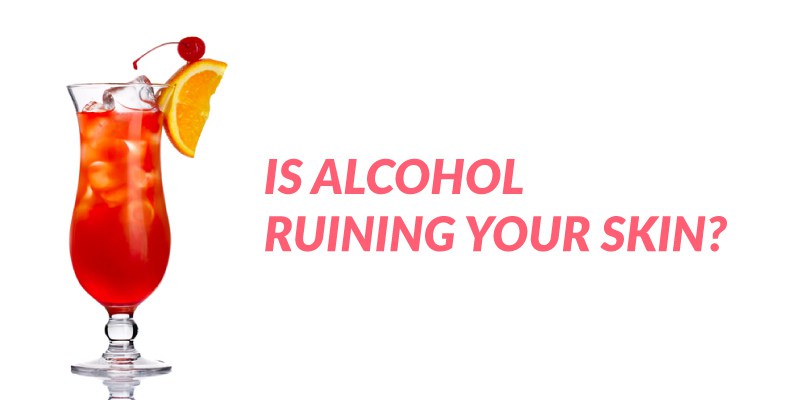Have you ever noticed that after a night of drinking a little too much, your skin seems puffy and dehydrated? Do you find that when you use alcohol-containing skincare products, your skin becomes much more irritated and dry? When it comes to alcohol and skin health, there seems to be a lot of confusion about how alcohol affects the skin and whether or not you should discard your alcohol-containing skincare products. With new years parties coming up soon, we chose to dedicate this post to answering some questions about how alcohol affects your skin, and what you can do to maximize your skin’s health.
Does Drinking Alcohol Damage My Skin?
In short, yes, although the impact will depend upon the type of alcohol that you drink (i.e. clear liquors versus hardy ales), how frequently you drink, and how much alcohol you consume per sitting. Alcohol intake can dilate the blood vessels and make your skin appear flushed. Blood vessels damaged from excessive alcohol intake can leak and allow fluid to enter soft tissue (such as your skin), which in turn makes your skin appear swollen. Alcohol exhibits a dehydrating effect on the body, which in turn affects the amount of moisture that can be distributed elsewhere in the body. Since alcohol consumption can deplete the body’s vitamin A levels, many individuals suffer from sallow, discolored skin after drinking. Dr. David Colbert of the New York Dermatology Group added that beverages that don’t contain added salts and sugars (such as shots) will generally not pose a huge detriment to your skin, as long as they are consumed in moderation. Conversely, drinks like beer and white wine tend to contain many sugars and salts, which mean that they will likely cause your skin to appear more swollen and dry the following day. Those with rosacea often report that alcohol consumption can induce flare-ups, with red wine, white wine, and beer being among the most common triggers (Everyday Health, Dr. David Colbert, Dr. Debra Jaliman and Dr. Jessica Krant for Huffington Post, WebMD, Livestrong).
But What About Applying Alcohol to My Skin?
There are few skincare ingredients as controversial as alcohol. However, it turns out that not all alcohol in skincare is detrimental to your health, and in some cases it can even benefit your skin. Ethanol in skincare can be used to dissolve other ingredients in a formulation, and to assist in delivery of these beneficial ingredients to your skin. Dr. Neal Schultz notes that the alcohol in skincare formulations typically dissolves just a few seconds after being applied to your skin, meaning that the other beneficial ingredients can be applied to your skin with a “cosmetically-superior finish.” In other words, alcohol is an unlikely yet effective penetration enhancer. Since most formulations contain only small concentrations of alcohol and said alcohol tends to dissolve quickly, alcohol-containing products are generally well-tolerated by all but the most sensitive of skin types. While alcohol can remove some of the skin’s oils, this usually should not result in severely dry or damaged skin. Additionally, it is important to note that many negative rumors about alcohol have not yet been proven in the scientific literature. For example, there is not enough evidence to suggest that topically-applied ethanol can increase the risk of skin cancer, and alcohol is generally seen as safe enough to use on most skin types. However, those with sensitive skin, lacerations, burns, and other compromised skin types should avoid alcohol-containing products, as they may induce irritation. While more research is needed to determine alcohol’s toxicity and safety in cosmetic formulations, recent research seems to suggest that alcohol is safe for the general population to use (Dr. Neil Schultz for DermTV, Journal of Occupational Medicine and Toxicology).
Bottom Line
Alcohol is an understandably controversial topic when it comes to skin health. While scientific literature has shown that drinking certain alcoholic beverages in moderation can benefit our overall health, frequent consumption of alcohol can adversely impact your skin. For example, flushing, sallowness, swollen/puffy skin and dry skin are all symptoms of alcohol consumption, with beers and white wines among the more aggravating types of alcohol. Conversely, topically-applied alcohols often serve as penetration enhancers that can deliver much-needed ingredients to your skin. Topically-applied alcohol can cause dryness in some users, but because it evaporates from the skin fairly quickly, alcohol should not present any problems to most individuals. In short, while ingesting alcohol may not be the best long-term choice for your skin, alcohol-containing formulations may be able to further beautify your skin.






